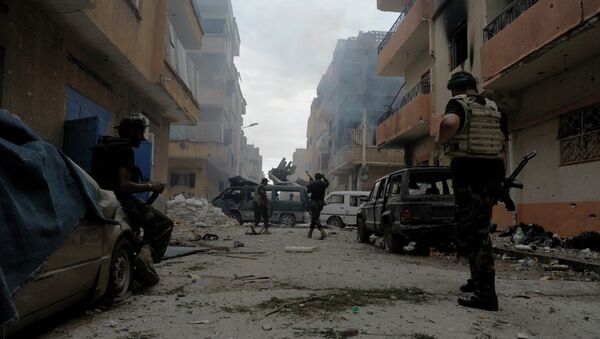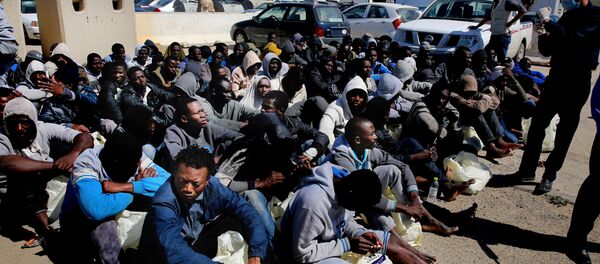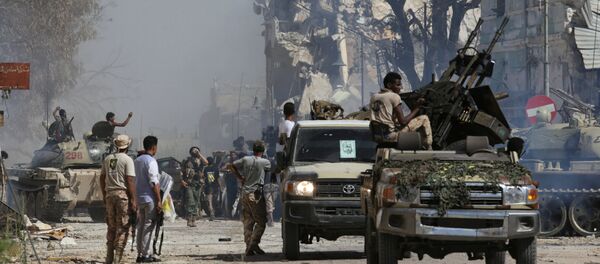How conditions in Libya became wretched enough to allow such conspicuous atrocities to take place has been absent from many mainstream accounts. Eugene Puryear and Sean Blackmon of Sputnik Radio's By Any Means Necessary asked Ben Norton, a progressive journalist with Alternet who is best known for his critiques of the mainstream media and US foreign policy, particularly in the Middle East, to help fill in the blanks.
"We need to stress the role NATO played in [Libya]," Norton said. "They turned one of the most prosperous countries on the African continent into a failed state that has multiple competing governments, that has a problem with Islamist extremism, and now has open air slave markets. Even mainstream media outlets like the BBC have acknowledged that, before 2011, Libya had one of the highest standards of living on the African continent. Now there is no functioning central government in parts of this country, it has been reduced to a total failed state."
In March 2011, "NATO militarily intervenes in Libya — ostensibly to protect civilians, although of course that was the pretense," he recalled. "The Libyan intervention was actually never about saving human lives or humanitarian reasons, it was about overthrowing Muammar Gaddafi from the very beginning. That's what they did, and we're living with the consequences of that, but media outlets refused to even mention what happened six years ago."
Worse, Norton adds, the mainstream media has engaged in soft censorship of the West's part in the collapse of a formerly stable country. "You have this constant string of articles about slavery in Libya, but they're all contextless. They treat it as if it's a human rights issue, and not as if it's a political problem. Of course this is a political problem that frankly I think could have been predicted six years ago. There were many signs among Libyan rebels who were extremely racist, who ethnically cleansed black Libyans, and who were dominated by Islamist extremists. Of course that has all been erased. Instead we're talking about Libya as if it just happens to have slavery now out of nowhere."
"The media coverage of Libya ebbs and flows in response largely to the US government. Most Americans didn't really know anything about Libya before 2011, but then when protests began in February and there was a discussion of military intervention, suddenly the media became incredibly interested. Every single day, there were numerous articles about Libya, about the evils of [then-Libyan president] Muammar Gaddafi. Then after October 2011, when the Libyan government is dissolved, Gaddafi is brutally murdered. He's lynched by a mob. After that, the media — suddenly not so interested in Libya anymore."
"Every year, every few months, there will be one story that trickles out, and then a slew of articles, and then it just goes back to media silence." said Norton. "In early November, CNN obtained video footage of one of these slave auctions in which sub-Saharan African refugees are sold for $400. The degree of inhumanity we're talking about is just unfathomable. So CNN obtained this footage and did a very good report on it. It was a thousand words, it had multimedia stuff, it had videos and even animated gifs. What it did not have was any historical context. It didn't mention the 2011 war at all, let alone NATO's role in it. It just talks about Libya as if it's this failed state out of nowhere."
Puryear mentioned that the fall of Gaddafi occurred under the reign of Democratic President Barack Obama and Secretary of State Hillary Clinton — who followed much the same interventionist policies that saw the US invade Iraq and Afghanistan under Republican President George W. Bush.
Norton concurred. "It's important to remember that it was a Democratic administration that oversaw the war in Libya. When it comes to the War on Terror, when it comes to overthrowing foreign governments that are not allied with the Washington consensus, that pursue an independent foreign policy, that use their natural resources to benefit their own population and not Western corporations, there is no difference between Republicans or Democrats."
"The New York Times showed that Hillary Clinton played a very leading role in pushing for intervention in Libya. This doesn't mean that Obama is certainly innocent, by no means, he made the decision. But Hillary Clinton was secretary of state and she was really pushing hard for aggressive military action. She's always been a hawk during her presidential campaigns, and Libya is really her baby in many ways."
Hand-wringing over actual slave trading aside, very little changes in American policy, even as its brutal outcomes are broadcast. "It's very important to stress the fact that Trump is horrible in so many ways, and I'm very concerned about so many of the things Trump is doing, not just here, but abroad," Norton noted. "But in many ways it's a continuation of what the Obama administration was doing, which in many ways was also a continuation of what Bush did before."





